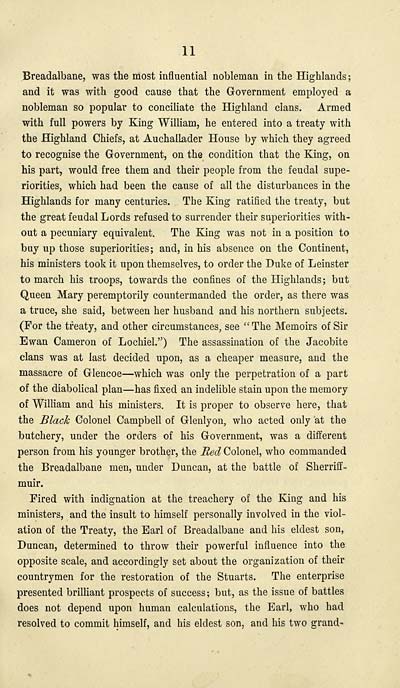Statement of the Breadalbane case
(17) Page 11
Download files
Complete book:
Individual page:
Thumbnail gallery: Grid view | List view

11
Breadalbane, was the most influential nobleman in the Highlands ;
and it was with good cause that the Government employed a
nobleman so popular to conciliate the Highland clans. Armed
with full powers by King William, he entered into a treaty with
the Highland Chiefs, at Auchallader House by which they agreed
to recognise the Government, on the condition that the King, on
his part, would free them and their people from the feudal supe-
riorities, which had been the cause of all the disturbances in the
Highlands for many centuries. The King ratified the treaty, but
the great feudal Lords refused to surrender their superiorities with-
out a pecuniary equivalent. The King was not in a position to
buy up those superiorities; and, in his absence on the Continent,
his ministers took it upon themselves, to order the Duke of Leinster
to march his troops, towards the confines of the Highlands; but
Queen Mary peremptorily countermanded the order, as there was
a truce, she said, between her husband and his northern subjects.
(For the treaty, and other circumstances, see " The Memoirs of Sir
Ewan Cameron of Lochiel.") The assassination of the Jacobite
clans was at last decided upon, as a cheaper measure, and the
massacre of Glencoe — which was only the perpetration of a part
of the diabolical plan — has fixed an indelible stain upon the memory
of William and his ministers. It is proper to observe here, that
the Black Colonel Campbell of Glenlyon, who acted only at the
butchery, under the orders of his Government, was a different
person from his younger brother, the Bed Colonel, who commanded
the Breadalbane men, under Duncan, at the battle of Sherriff-
muir.
Fired with indignation at the treachery of the King and his
ministers, and the insult to himself personally involved in the viol-
ation of the Treaty, the Earl of Breadalbane and his eldest son,
Duncan, determined to throw their powerful influence into the
opposite scale, and accordingly set about the organization of their
countrymen for the restoration of the Stuarts. The enterprise
presented brilliant prospects of success; but, as the issue of battles
does not depend upon human calculations, the Earl, who had
resolved to commit himself, and his eldest son, and his two grand-
Breadalbane, was the most influential nobleman in the Highlands ;
and it was with good cause that the Government employed a
nobleman so popular to conciliate the Highland clans. Armed
with full powers by King William, he entered into a treaty with
the Highland Chiefs, at Auchallader House by which they agreed
to recognise the Government, on the condition that the King, on
his part, would free them and their people from the feudal supe-
riorities, which had been the cause of all the disturbances in the
Highlands for many centuries. The King ratified the treaty, but
the great feudal Lords refused to surrender their superiorities with-
out a pecuniary equivalent. The King was not in a position to
buy up those superiorities; and, in his absence on the Continent,
his ministers took it upon themselves, to order the Duke of Leinster
to march his troops, towards the confines of the Highlands; but
Queen Mary peremptorily countermanded the order, as there was
a truce, she said, between her husband and his northern subjects.
(For the treaty, and other circumstances, see " The Memoirs of Sir
Ewan Cameron of Lochiel.") The assassination of the Jacobite
clans was at last decided upon, as a cheaper measure, and the
massacre of Glencoe — which was only the perpetration of a part
of the diabolical plan — has fixed an indelible stain upon the memory
of William and his ministers. It is proper to observe here, that
the Black Colonel Campbell of Glenlyon, who acted only at the
butchery, under the orders of his Government, was a different
person from his younger brother, the Bed Colonel, who commanded
the Breadalbane men, under Duncan, at the battle of Sherriff-
muir.
Fired with indignation at the treachery of the King and his
ministers, and the insult to himself personally involved in the viol-
ation of the Treaty, the Earl of Breadalbane and his eldest son,
Duncan, determined to throw their powerful influence into the
opposite scale, and accordingly set about the organization of their
countrymen for the restoration of the Stuarts. The enterprise
presented brilliant prospects of success; but, as the issue of battles
does not depend upon human calculations, the Earl, who had
resolved to commit himself, and his eldest son, and his two grand-
Set display mode to:
![]() Universal Viewer |
Universal Viewer | ![]() Mirador |
Large image | Transcription
Mirador |
Large image | Transcription
Images and transcriptions on this page, including medium image downloads, may be used under the Creative Commons Attribution 4.0 International Licence unless otherwise stated. ![]()
| Histories of Scottish families > Statement of the Breadalbane case > (17) Page 11 |
|---|
| Permanent URL | https://digital.nls.uk/94764571 |
|---|
| Description | A selection of almost 400 printed items relating to the history of Scottish families, mostly dating from the 19th and early 20th centuries. Includes memoirs, genealogies and clan histories, with a few produced by emigrant families. The earliest family history goes back to AD 916. |
|---|

